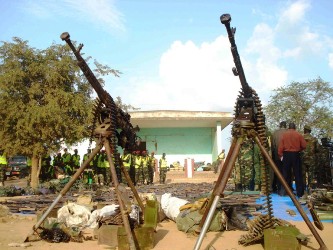Sudan raises red-flag over child soldiers recruitment
By Julius N. Uma
June 12, 2010 (JUBA) — Sudan was among six other African countries that signed the N’Djamena Declaration, a binding document that outlines the commitments to and reinforces international standards for the protection of children.

This historic commitment was part of the closing ceremony of a regional conference organized by the Chadian Government and United Nations Children’s Fund (UNICEF) based on the theme: “Ending Recruitment and Use of Children in Armed Forces and Groups Contributing to Peace, Justice, & Development.”
Cameroon, Chad, the Central African Republic, Niger and Nigeria, according to a UNICEF statement issued yesterday, were the other countries that made commitment towards ending recruitment of child soldiers and to support social reintegration.
Sudan Tribune has, however, learnt that only Chad and Sudan have so far signed and ratified the OPAC, while Cameroon and Nigeria have signed, but have not yet ratified. On the contrary, Central African Republic and Niger have neither signed nor ratified the protocol.
“The interest given by stakeholders to this conference is unprecedented in the history of Chad. We, in Chad have taken into account certain conditions and measures to respect the rights of our children affected by armed conflicts,” Ms Ngarmbatina Odjimbeye Soukate, Chadian Minister of Social Action said in the statement.
“If we stand idle to these atrocities taking place in the very fabric our societies affected by constant conflict, who else will take action in our place,” she added
Dr. Marzio Babille, UNICEF’s representative in Chad said the commitment against child soldiering was not only a new beginning in Africa, but a firm step towards giving all children in the region the dignity of a childhood they’ve so often been deprived of by decades of conflict.
“It is now time to translate these powerful words into concrete actions,” Dr. Babille said, adding that,” UNICEF Chad remains committed to sustain efforts of all the countries in the region to achieve that essential and noble goal.
Meanwhile, a monitoring committee has been established as one of the key action points of the N’Djamena Declaration.
The committee, earmarked to meet regularly, will monitor the implementation of the Declaration; develop an action plan and timetable for reporting.
SECURITY COUNCIL RESOLUTIONS
The United Nations Security Council (UNSC) Resolutions 1612 and 1882 call for an end to the recruitment and use of children in armed forces and groups.
Over the past years, the conflict in Sudan’s Western region of Darfur and series of unrest in the other countries have also resulted in the proliferation of small arms, light weapons, organized crime and unexploded ordnances.
Nigeria for instance periodically faces sectarian violence with serious consequences on children’s rights. Also, the influx of refugees from neighboring countries and movements of people uprooted due to conflict also lead to serious child protection challenges.
Last year, a report released by Oxfam, a British charity group said nearly 2,000 people reportedly die daily from small arms, with most deaths recorded in Sudan, Democratic Republic of Congo and Central African Republic.
(ST)
